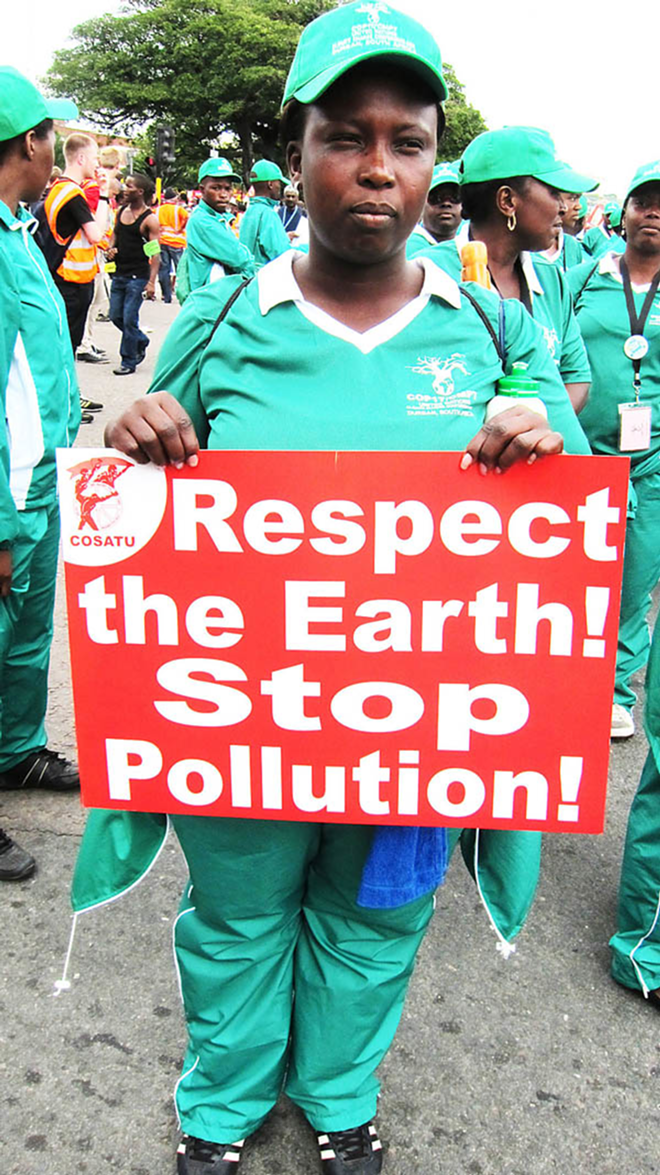
It was a familiar scene to anyone who's watched the Occupy movement do their thing over the past few months: a group of kids holding signs and mic checking each other, chanting, "The people united will never be defeated!" as a well-armed police force forms a circle around them.
But here at the International Convention Centre in Durban, South Africa on December 9, the officers were United Nations police, and as there were hundreds of well-dressed international delegates milling about in the lobby, the pepper spray option was out of the question.
This was the last day of the United Nations Climate Change Summit, and activists were taking one last stand to save the planet from overheating.
"They tried. The fact that world leaders blew it again was not the fault of the protesters. Every year for the past 17, negotiators from just about every country on the planet have assembled in early December to talk about how to lower greenhouse gas emissions, which scientists say are causing the earth's climate to change rapidly and will eventually lead to a massive global environmental disaster. Each year, these climate delegates fly to exotic locales and discuss the dilemma at something called a 'Conference of Parties' (or COP, hence the nickname for this year's conference: COP 17). They make impassioned speeches and sign papers and shake hands.
And every year the problem gets a little worse.
Last year was the hottest year on record. According to a World Meteorological Organization report issued earlier this month, 13 of the last 15 years had the warmest average global temperatures ever recorded. Incidentally, since the climate talks began, greenhouse gas emissions have gone up by 50 percent; according to a Global Carbon Project analysis, they rose almost 6 percent last year alone.
If things continue like this, scientists say global warming will devastate the planet and cause massive suffering for millions. This was not lost on the pissed-off activists attending the climate conference, members of NGOs like Greenpeace and 350.org who are part of the growing international climate justice movement. They came to Durban to say enough with the bullshit; it's time to act now before it's too late. Midway through the two-week conference, on December 3, their cause was joined by more than 5,000 protesters from South Africa and around the world in a Day of Action, marching from downtown Durban to the convention center.
But their efforts fell on deaf ears. The activists who staged the last-ditch protest in the ICC lobby were ejected, and the conference yielded only a pitiful deal called the "Durban Platform for Enhanced Action," which commits the nations of the world to keep talking about the issue. The Durban Platform says 2020 would be the earliest a global agreement could be signed into law. How far and how fast countries will cut their emissions is still to be determined. "It's an empty shell of a plan," said Andy Atkins, executive director of Friends of the Earth. "It leaves the planet hurling towards catastrophic climate change."
Climate change has become one of the most divisive and politically charged issues in international politics. As the scientific consensus continues to solidify (indeed, despite propaganda to the contrary, over 97 percent of scientists studying the climate believe that climate change is caused by people burning fossil fuels), it has driven an enormous wedge between rich and poor countries who come together to discuss the issue every year. From the Bolivians in the Andes who are losing the glaciers they depend on for water to the islanders in the South Pacific who see their lands disappearing at an alarming rate, the developing countries of the world that have done the least to harm the environment are shouldering the worst effects of global warming. They, along with a growing list of NGOs and climate justice activists, increasingly view the lack of international action on climate change as class warfare. They are demanding that industrialized nations acknowledge their enormous debt to the planet by drastically reducing their carbon emissions, and then by helping the countries who are suffering the effects. Climate reparations, if you will.
These ideas haven't gone over too well here in the U.S., the world's largest historic emitter of greenhouse gases. Throughout the years of climate talks, the U.S. has shown smug indifference to global consensus. Since the UN adopted the Kyoto Protocol in 1997, the world's only legally binding treaty to reduce carbon emissions, the U.S. was the one country that refused to ratify it. Many hoped Obama's election would change all that, but after his disastrous intervention at COP 15 that resulted in the do-nothing Copenhagen Accord, expectations have significantly dwindled.
Shortly before he was thrown out with the rest of the protesters on the final day of COP 17, Greenpeace International Executive Director Kumi Naidoo said the reason for U.S. inaction on climate change is quite simple: "For every one U.S. congressperson, there are three full-time fossil fuel lobbyists that make sure that national climate legislation won't pass and that the U.S. can't do a thing when they get to these conferences." A Greenpeace report issued during the Durban talks entitled "Who's Holding Us Back?" lists the corporations and trade groups that spend around $3.5 billion annually to derail any chance of climate change legislation passing in the U.S. It should come as no surprise that the list is topped by the carbon-spewing corporations who stand the most to lose by laws regulating the dumping of greenhouse gases into the atmosphere. Companies like ExxonMobil, Royal Dutch Shell, BP, Chevron, ConocoPhillips and Koch Industries have been pulling politicians' strings for years to ensure they keep the right to pollute.

